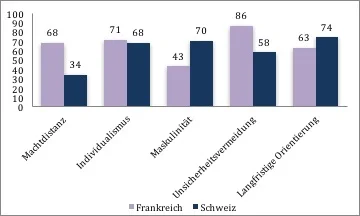Leadership and Management in France
Leadership and management in France.
A culture of many cultures

French culture is a mosaic of subcultures. The south belongs to the Mediterranean culture, the north is closer to northern European cultures, the west with Brittany and Normandy is more British and the Alsace and Lorraine region is influenced by German culture. Nonetheless, the French people offer an outward image in which values and behaviors are largely common to all subcultures.
Traditional values and concept of leadership.
values and behavior patterns
The French's relationship to power shapes their history. Even the map reflects this value: most motorways lead to Paris from all directions. The capital looks like an octopus, stretching out its tentacles across the country. The history of France is told in the streets of Paris through numerous monuments and statues of the great figures who shaped it. Even if they were controversial in their lifetime, the French remain fascinated by their former rulers, whether they were kings or presidents. Like state presidents, corporate CEOs have more power and decision-making authority than in many other countries.
French society is very hierarchical by class: at the top is the "haute bourgeoisie", which includes the wealthiest families, including a small aristocratic elite that still wields much influence, and the top political and business figures. Then comes the “petite bourgeoisie”, consisting of managers from large companies and managing directors from small companies. Then, the "classe moyenne" with the middle cadre of organizations, teachers and shopkeepers. Ultimately, at the bottom is the “classe populaire”, i.e. the employees with a minimum level of training (Hall, 1990, 97).
According to Hall and Hofstede, the French need clear structures and rules and, for example, value having all relevant information available before meetings. They don't appreciate surprises. Paradoxically, this does not mean that they are always willing to follow rules and laws. They behave much more situationally, i.e. depending on the context.
Leadership and Management France - Leadership style.
Superiors expect obedience from subordinates. In view of the penchant for power mentioned above, this expectation is logical but conflicts with individualism. Employees should accept major differences in power and still have a strong individualistic attitude. The following statement underlines this collision: "In adult life the French expect obedience from subordinates, creating a conflict in a people who place a premium on individuality (Hall, 1990, p. 107).
“La Direction par Objectifs” (Management by Objectives)

Cultural dimensions (compared to Switzerland)
